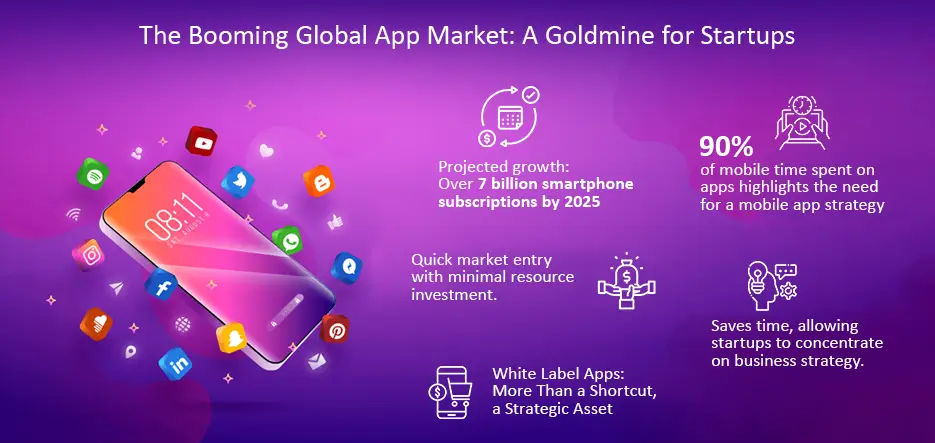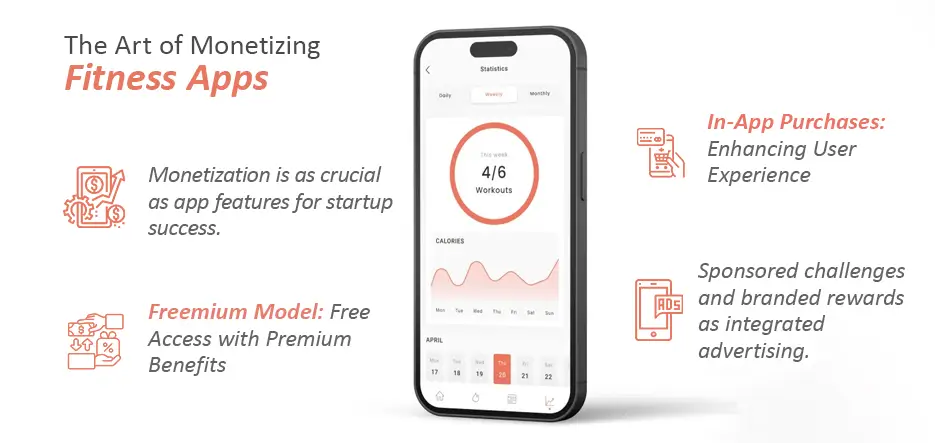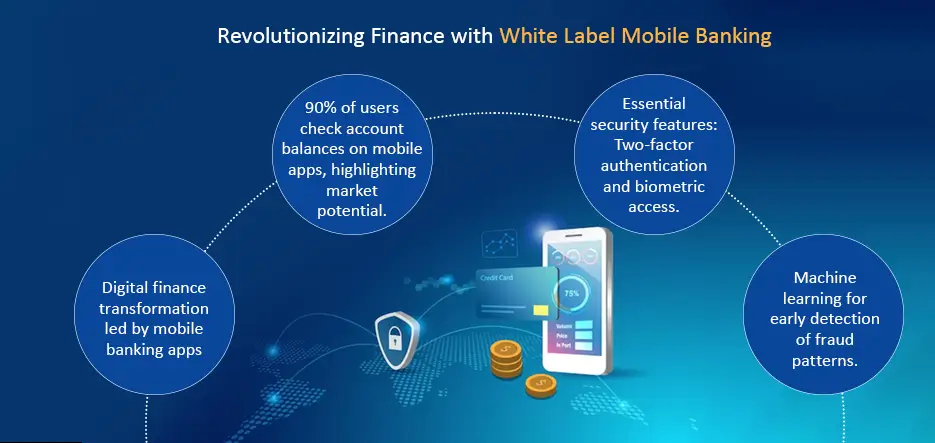Table of Contents
Did you know the global app market is expected to grow significantly, with a projection of over 7 billion smartphone mobile network subscriptions worldwide by 2025? This presents a ripe opportunity for startups to capture this expanding market. Furthermore, data indicates that 90% of mobile time is spent on apps, underscoring the importance of a mobile app strategy for startups.
White Label App Development refers to creating a generic application by one company to be rebranded and sold by another company. This allows the purchasing company to present the app as their product without investing in the technology or infrastructure to develop it from scratch. The concept is similar to the retail practice where products are produced by one company and sold under another company’s brand.
Startups, in particular, stand to gain significantly from white label app development. For these burgeoning businesses, the ability to quickly deploy an app with minimal investment in time and resources can be a game-changer. It gives them an instant platform to reach their audience, test their market, and scale their operations effectively.
White label apps are not only cost-effective but also time savers. Startups can leverage white label app builders to customize apps to their branding, allowing them to focus on core business strategies rather than on the technicalities of app development. This agility can be crucial in a fast-paced market where adapting and responding to consumer needs is key to success.
For startups looking to discover their niche, white label app development is not just a shortcut but a strategic tool. It empowers them with the technology they need to compete and allows them to maintain focus on their unique selling propositions and customer relationships.

Market Trends and the Popularity of White Label Apps
White label app development has emerged as a critical solution in this context, offering a blend of speed, customization, and market reach that is particularly advantageous for startups.
The market for apps is vast and growing. With millions of apps in major app stores, the challenge for any business is not just to make another app but to bring a unique offering. This is where white label mobile app solutions shine. They allow businesses to jumpstart their app presence using pre-built platforms that can be customized to their needs.
White label solutions are growing in popularity because they strike an essential balance. They provide a robust framework that’s tested and ready to go, a massive advantage over building from scratch. Yet, they still offer room for businesses to make their mark with branding and specialized features.
Impact on Speed to Market for Startups
For startups, speed to market can mean the difference between success and failure. A white label mobile app builder can provide a startup with a ready-to-launch product in a fraction of the time it would take to develop an app from the ground up. This rapid deployment allows startups to capture market opportunities much faster than their competitors, who may be bogged down in development cycles.
Using white label app development, a startup can have an app in the app stores within weeks, not months or years. It’s not just about speed, though. These solutions offer reliability and a user-tested experience, which are invaluable for gaining user trust. The faster a startup can iterate and improve upon a stable base app, the quicker it can respond to user feedback and market demands.
Additionally, the agility offered by white label solutions is critical for startups looking to pivot. As market trends shift, startups must adapt, and white label apps provide the flexibility to do so without requiring extensive redevelopment.
Steps in White Label App Development
White label app development begins with choosing a white label mobile app development platform. This platform serves as the foundation upon which the custom app will be built. Startups select a white label solution that aligns with their business model and target audience. The process typically unfolds as follows:
- Market Analysis: A thorough analysis helps identify the target audience’s needs, ensuring the app serves a real market purpose.
- Selection of a Platform: The next step is to choose a white label platform that can be tailored to the business’s requirements.
- Feature Integration: The chosen platform is then augmented with essential features for the app’s functionality and appeal.
- Branding: The app is branded with the startup’s logo, color scheme, and other brand elements to make it distinctly their own.
- Testing: Before launch, the app undergoes rigorous testing to iron out bugs and ensure a smooth user experience.
- Launch: The app is launched on relevant app stores, ready to be downloaded by users.
- Marketing and Scaling: Post-launch, the focus shifts to marketing the app and scaling it according to user feedback and growth.
Each step is pivotal in the journey from a generic platform to a market-ready app that can stand out among competitors.
Customization of White Label Solutions
Customization is the heart of the white label mobile app development process. It’s where generic becomes specific, and a standard solution transforms into a custom app development service that reflects a startup’s unique brand and vision.
Customization covers various aspects, including:
- User Interface (UI): The UI is tailored to ensure it is intuitive and reflects the brand’s identity.
- Functionality: Depending on the startup’s sector, specific functionalities are integrated to meet user expectations.
- Third-Party Integrations: Integrating with other services and APIs can extend the app’s capabilities and offer more value to users.
- Feedback Incorporation: User feedback is a goldmine of insights, and white label solutions often allow for quick updates and feature additions based on this feedback.
This level of customization means that startups can offer their users a product that looks professional, feels unique, and is highly functional.
White Label Fitness App: Energizing the Market
White label app development plays a pivotal role in this sector, providing a swift and effective way for businesses to enter the market with a robust product.
Features of a Competitive White Label Fitness App
A competitive white label fitness app is more than just a digital platform; it’s a personal trainer, a nutritionist, and a wellness guide rolled into one. The best white label apps in the fitness category share a common set of features that cater to the diverse needs of their users.
Personalization is key. Users look for apps that offer tailored workout plans, dietary suggestions, and progress tracking. Integrating AI-driven analytics can help create customized fitness regimes for users, adapting to their changing fitness levels and preferences.
Social connectivity enhances the experience by allowing users to share achievements, participate in challenges, and maintain accountability through community features. An effective app should also include a reward system that motivates users by tracking milestones and celebrating achievements.
Another essential feature is data synchronization across devices. It ensures that users can access their workout plans and track their progress on their phones, tablets, or smartwatches.
The app must also provide video tutorials and exercise guides, ensuring that users clearly understand workout techniques to prevent injuries. Additionally, the option for live classes and coaching can bring a more personalized and interactive dimension to the app.
Monetization Strategies for Fitness Apps
For startups, monetizing a fitness app is as critical as its features. The right monetization strategy can ensure the app’s financial sustainability and growth potential.
One popular approach is the freemium model, where the app is free to download, and users can access basic features without cost. Advanced features like personalized training plans or specialized diet regimes can be gated behind a subscription fee.
Another strategy is in-app purchases. Users can buy health-related products, book personal training sessions, or purchase advanced workout modules. Partnerships with fitness equipment brands or health food companies can also open additional revenue streams.
Advertising is another avenue, although it needs to be implemented thoughtfully to not detract from the user experience. Sponsored challenges or branded rewards can integrate advertising to add value to the user.

White Label Food Delivery App: Satisfying Hunger for Success
Food delivery apps are a thriving slice of the on-demand service pie, boosting restaurant sales and consumer convenience. White label app development is pivotal, enabling quick launch strategies to satisfy the surging appetite for food delivery solutions.
Essential Components of a Food Delivery App
An effective white label food delivery app blends an easy-to-use interface with solid performance. It must have:
- Straightforward UI: The user interface should be clear, letting customers order with minimal clicks. Quality food images, simple navigation, and a streamlined layout are crucial.
- Secure Payments: Diverse and secure payment methods, like cards, e-wallets, and cash on delivery, are fundamental for hassle-free payments.
- Live Order Tracking: Customers value tracking their orders in real-time, appreciating transparency, and staying updated.
- Feedback System: Features for rating and reviewing food and service foster trust and high standards.
- Dependable Support: Prompt assistance for any customer issues is essential for satisfaction.
Integrating Local Restaurants and Logistics
A food delivery app’s success hinges on its restaurant partnerships and delivery efficiency. White label app development companies must closely ally with local food places, ensuring an assortment of cuisines and prices.
- Restaurant Collaboration: Solidifying ties with local dining spots is crucial. The app should offer a control panel for partners to handle menus, pricing, and orders.
- Smart Dispatch: A savvy dispatch system smartly assigns delivery staff, considering location, congestion, and order counts.
- Stock Control: To avoid order issues, the app must reflect the eatery’s live inventory.
- Data Analysis: Restaurants and app owners gain from analytics, revealing favorites, busy periods, and buyer likes.
White Label Telemedicine App: Revolutionizing Healthcare Access
Healthcare has evolved rapidly, thanks to digital innovation. Telemedicine apps are changing how we access care. White label app development is key for health providers to introduce telemedicine services swiftly.
Compliance and Security in Telemedicine Apps
In healthcare, compliance and security are paramount. Telemedicine apps must comply with strict regulations like HIPAA in the U.S., safeguarding patient data. A white label telemedicine app from a top app development company in USA guarantees adherence to these standards.
Security must be tight, guarding patient info and maintaining data integrity. This involves secure logins, end-to-end encryption, and consistent security checks. Those aiming to hire white label app developers need experts with a solid history in creating secure healthcare applications.
User Experience in Telemedicine Platforms
A telemedicine app’s success hinges on a seamless user experience. The interface should be clear, allowing patients to easily set appointments, view health records, and talk to medical staff.
Key features should include video calls, chat functions, and straightforward appointment scheduling. These must be consistent across devices, ensuring access for all users. AI integration can guide patients from symptom assessment to the appropriate care level, improving the experience.

Digital dating is now mainstream, and white label app development lets entrepreneurs quickly start dating apps, seizing a share of this profitable market.
Safety Features and User Verification
For white label dating apps, user safety and identity checks are critical. When creating a white label iOS app, developers must focus on solid safety features. This starts with thorough user verification, possibly through phone checks, photo validation, or social media links for identity confirmation.
Developers can also integrate AI to weed out fake profiles and use encryption to keep personal chats secure. A reporting function is key, too, allowing users to flag any concerns.
Those opting for custom mobile app development services should confirm that these services include cutting-edge security. User confidence in their data’s safety is crucial, and any breach could seriously harm the app.
Algorithmic Matching vs. User Preferences
A dating app’s heart is its matching system. White label app development has enabled complex algorithms considering various user data to suggest matches. But it’s essential to mix algorithmic matches with user choices.
Algorithms must adapt, learning from user feedback to refine match quality. However, users also value setting their search parameters, like age, hobbies, and location.
White Label Grocery Delivery App: Streamlining Daily Shopping
The shift to digital has reshaped grocery shopping, with white label grocery delivery apps bringing unmatched ease and satisfaction. Businesses utilize white label app development for creating dependable, easy-to-use, and swift apps.
Inventory Management and Real-Time Updates
Top-notch inventory management is vital for a grocery delivery app’s success. It must mirror store stock accurately online. Live updates are essential—they maintain customer trust by ensuring items in their cart are available for delivery.
A leading mobile app development company skilled in on-demand apps knows the value of a strong inventory system. This system should merge smoothly with the app, giving live updates on stock levels, expiry dates, and restocking. It keeps the app informed, aiding retailers’ and buyers’ purchase choices.
Building a Reliable Delivery Network
The core of a grocery app is its delivery system. It must deliver orders quickly and in prime condition. This calls for a network of trustworthy couriers, smart route planning, and a flexible system that can handle sudden changes, like traffic or bad weather.
An on demand app development company will zero in on logistics that refine delivery paths. This cuts down on delivery time and cost. The app should let customers watch their orders’ journey, adding transparency and boosting their shopping experience.
White Label Messaging App: Connecting Users with Ease
In an age where communication is key, white label messaging apps have become vital for staying in touch. White label app development allows for the creation of messaging apps that combine the essence of direct communication with the flexibility of customization.
Encryption and Privacy Features
Privacy and security are the cornerstones of any trusted messaging app. Users want the assurance that their conversations are private and protected from unauthorized access. iOS app development companies and Android app development agencies specializing in white label solutions strongly emphasize implementing end-to-end encryption. This security protocol ensures that only the communicating users can read the messages, with no possibility of interception by third parties, not the service providers themselves.
Furthermore, features like self-destructing messages, secure file transfers, and two-factor authentication are now standard user expectations. These features give them control over their data and peace of mind, knowing their information is secure.
Incorporating these privacy features is not just about technology; it’s about building trust. With reports of data breaches and privacy concerns on the rise, an app that can guarantee privacy is not just a service but a promise.
Cross-Platform Compatibility and Features
A white label messaging app’s value increases exponentially when accessible across different devices and platforms. Users expect seamless syncing between their smartphones, tablets, and computers. Whether they use iOS or Android, the experience should be consistent and uninterrupted.
Cross-platform compatibility is a complex challenge that iOS app development companies and Android app development agencies face. They must ensure that the app’s features perform flawlessly across all platforms. This includes not only messaging but also voice and video calls, group chats, and the sharing of various media types. The goal is to create an ecosystem where users can switch between devices without losing context or functionality.
White Label Taxi App: Navigating the Competitive Landscape
Taxi apps have revolutionized city travel, making it simpler and swifter. White label app development lets firms introduce their taxi apps, filled with innovative, customer-focused features.
Location-Based Services and Fare Calculation
A top-notch white label taxi app relies on exact geolocation services. These are the bedrock for matching riders with drivers and offering route optimization and arrival times.
Advanced GPS technology tracks trips, giving real-time updates. It’s vital to hire mobile app developers who excel in geolocation to ensure flawless service.
Clear fare information is crucial. Riders need to know the cost upfront. White label taxi apps calculate fares by considering distance, traffic, time, and high-demand pricing. This clarity in pricing helps avoid end-of-trip surprises.
Driver Partnerships and Revenue Models
Building strong ties with drivers is key to a taxi app’s growth. The app should give drivers an easy-to-navigate platform, helping them manage rides, income, and schedules.
The app must accommodate various revenue models, providing the versatility drivers and businesses desire. This includes commission-based and subscription options for more predictable earnings.
Adding incentive programs can spur drivers to higher service levels and customer satisfaction. These motivate and enhance user experience, leading to positive reviews and customer loyalty.
White Label Mobile Banking App: Financial Management at Your Fingertips
Digital advancements have revolutionized finance, with mobile banking apps at the forefront. White label app development lets banks quickly offer secure, convenient financial access. Nearly 90% of users view their account balances using mobile banking apps. This trend underscores the importance for financial institutions to invest in white label app development for a piece of this growing market.

Security Measures and Fraud Prevention
In mobile banking, security is essential. White label mobile banking apps must have top-tier security to safeguard data and prevent fraud. This means secure login methods like two-factor authentication and biometric access, adding extra security layers.
Advanced encryption is crucial for safe data transfer between the app and bank servers. Mobile application consulting services focus on these security aspects to ensure the platform’s reliability and trust.
Fraud prevention also involves monitoring and alerting users to unusual activities. Instant alerts about strange transactions help users act fast to avoid fraud. Machine learning helps identify unusual patterns, which is key in early fraud detection.
Integrating Banking Services and User Experience
A white label mobile banking app’s success is blending comprehensive banking services with a great user experience. Users want an app where they can easily view balances, transfer money, pay bills, and more.
Developers should aim for an intuitive, user-friendly app. Features like personalized dashboards and customizable settings boost user engagement. In-app customer support, like chatbots or live chat, offers convenient assistance.
Incorporating financial management tools, like budget trackers, adds value. These features help users manage finances and set the app apart from competitors.
White Label Social Media App: Creating Communities Online
Social media’s rise has transformed our interactions, sharing, and engagement. Through white label app development, companies can launch social platforms that nurture online communities and promote interaction.
Content Moderation and Community Guidelines
A dynamic, secure online community hinges on effective content moderation. A white label social media app needs a robust system to keep the space positive. It involves clear guidelines that define what’s appropriate on the app.
Moderation combines automated tools with human review. AI can spot potential violations, and human moderators apply critical judgment to complex issues. The aim is to foster a safe space for expression, free from harmful or offensive content.
Companies should ensure their enterprise mobile application development includes a scalable moderation system. As user numbers grow, the system must evolve to uphold platform standards.
Engagement Tools and Analytics
A white label social media app should provide engaging tools for user retention. Features like custom feeds, stories, messaging, likes, comments, and shares are vital. They turn the app into a center for user interaction.
Analytics are key to decoding user behavior and guiding the app’s evolution. Data on user actions helps deliver personalized content and improve experiences. This boosts satisfaction and offers businesses insights to tweak their strategies.
Conclusion
Startups must move quickly and adapt fast. White label app development is critical, helping launch apps quickly and efficiently.
A mobile app development firm focusing on white label products can equip startups with tailored apps that showcase their brand and meet their unique requirements. This strategy saves resources, enabling startups to concentrate on their primary business objectives, customer growth, and market reach.
White label app development is set to grow as technology advances. Expect more complex, feature-filled white label apps that can be launched faster and with less expertise. Personalized user experiences will increasingly rely on artificial intelligence, machine learning, and big data.
For startups, this translates to easier competition. Technological progress brings new chances for startups to lead and shake up markets. A mobile app development agency in step with these trends can arm startups with the essential tools for success in a digital-first world.
Step into the future with White Label App Development. Partner with a custom mobile application development company like A3Logics now and elevate your startup with a bespoke app solution that resonates with your audience. The moment to move is today!
Book 30 Minutes Free Consultations with A3logics Experts to Start Your App Journey Today!
FAQs
What is White Label App Development?
White Label App Development lets startups rebrand a ready-made app as their own. It saves time and costs, letting them hit the market quickly with a tested product. This cost-efficient route frees startups to zero in on business expansion rather than app creation.
How Can a White Label Fitness App Make an Impact?
A white label fitness app must offer personalized experiences, wearable tech integration, and unique content like tailored workout plans and nutrition tracking to stand out. It should have standout features that speak directly to a specific audience and meet untapped market needs.
What Features Define a Top White Label Food Delivery App?
A leading white label food delivery app features live delivery tracking, user-friendly interfaces, reliable payment systems, and excellent customer support. Integrating with local eateries and smooth logistics are also key to high service standards and customer happiness.
What should startups consider when launching a white label telemedicine app?
Startups should focus on compliance, data security, and user privacy for telemedicine apps. It’s important to offer an uninterrupted experience with video calls, managing prescriptions, and accessing medical records for patients and healthcare professionals.
How can a white label dating app ensure user safety and privacy?
A secure white label dating app must have thorough profile checks, in-app reporting for misconduct, and block/report functions. Safeguarding user data with encryption and obeying privacy regulations is essential for user trust.






